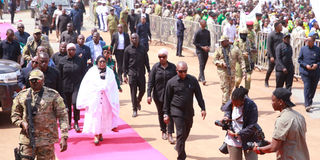President Samia calls for transformation of Tanzanian traditions into economic opportunities

What you need to know:
- Addressing attendees at the closing ceremony of the third edition of the National Tradition event at Majimaji Grounds in Songea, Ruvuma Region on Monday, September 23, President Hassan emphasised that Tanzania's traditions, arts, and innovations are crucial for generating employment and stimulating trade
Songea. President Samia Suluhu Hassan has called on tourism stakeholders to convert Tanzania's rich cultural traditions into viable business ventures that can drive economic growth.
Tanzania has seen a rise in tourism earnings, bolstered by the industry's recovery from the global Covid-19 pandemic and various marketing initiatives, including the Royal Tour Documentary featuring President Hassan as a tour guide.
According to figures from the Bank of Tanzania (BoT), travel receipts surged by $531.8 million to reach $3.534 billion for the year ending July 2024, compared to $3.002 billion the previous year.
The BoT's Monthly Economic Review for August 2024 indicates this increase was driven by a 22 percent rise in tourist arrivals, totalling 2,026,378.
Addressing attendees at the closing ceremony of the third edition of the National Tradition event at Majimaji Grounds in Songea, Ruvuma Region on Monday, September 23, President Hassan emphasised that Tanzania's traditions, arts, and innovations are crucial for generating employment and stimulating trade.
"Basata [the National Arts Council] must be prepared to lead this initiative forward, and private sector engagement will be crucial," she noted.
During her recent engagements, President Samia Suluhu Hassan announced ambitious plans by the Ministry of Arts, Culture and Sports to establish 100 Kiswahili centres across the globe in collaboration with Tanzanians living in the diaspora.
This initiative aims to not only promote the Kiswahili language but also to create new economic opportunities for the youth.
By leveraging online platforms and applications, expatriates are encouraged to foster interest in the language, which is seen as a valuable asset in the globalised world.
"Platforms teaching Kiswahili, just like those teaching English, can open global doors," President Hassan stated.
She emphasised the need for Tanzanians abroad to actively share Swahili dramas, literature, and other cultural content with a wider audience, capturing the interest of those eager to learn.
This approach not only serves to enhance cultural exchange but also presents potential revenue streams for young people through language instruction and cultural products.
Moreover, she urged Tanzanian universities to partner with international institutions to enhance the reach and effectiveness of this initiative.
As part of her regional tour, President Hassan praised the ongoing rehabilitation and expansion of Songea Airport, highlighting its pivotal role in boosting regional trade and business.
The airport's significance is underscored by a remarkable increase in passenger numbers, which surged from 3,600 in 2021 to an impressive 19,620 in 2024.
This growth reflects the burgeoning economic potential of the region and the government's commitment to enhancing infrastructure that facilitates commerce and connectivity.
Additionally, during the Cultural and Traditional Week celebrations, President Hassan visited the Majimaji National Museum in Songea to honour the legacy of the Majimaji warriors, who valiantly resisted German colonial rule between 1905 and 1907.
In a solemn ceremony, she laid a wreath at the mass grave of 66 Majimaji warriors executed on February 27, 1906, and placed traditional weapons at the Askari Monument, a powerful tribute to their bravery and sacrifice.
The President also paid homage to Nduna Songea Mbano Luwafu, a prominent leader during the Majimaji War who was executed shortly after his comrades.
Elders at the museum called upon the Tanzanian government and the Ministry of Natural Resources and Tourism to locate and repatriate Nduna Songea’s head from Germany, emphasising the importance of preserving the legacy of the Majimaji fighters for future generations.
In recognition of his contributions, both Songea town and the surrounding districts proudly bear his name, ensuring that his pivotal role in Tanzania's struggle for independence remains etched in the nation’s memory.
The Majimaji War itself symbolises a crucial chapter in the fight against colonial oppression, driven by harsh policies such as forced labour, heavy taxation, and land confiscation.
President Hassan's visit underscores the ongoing efforts to commemorate this significant historical event, reinforcing its cultural and historical importance as an integral part of Tanzania’s national identity.
She is anticipated to conclude the Cultural and Traditional Week festivities before embarking on a comprehensive regional tour, set to wrap up on Sunday, September 29, 2024.




